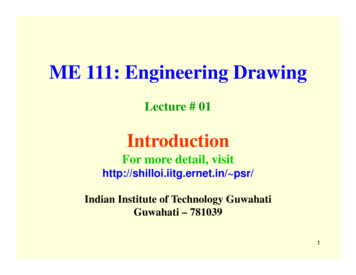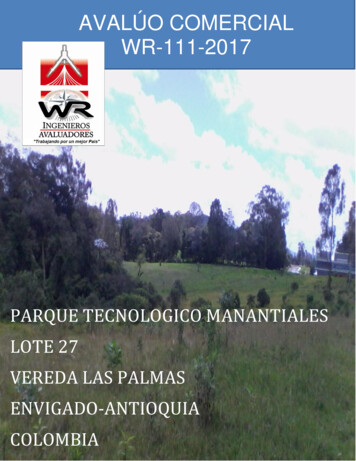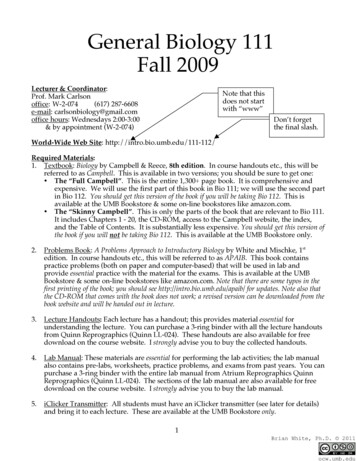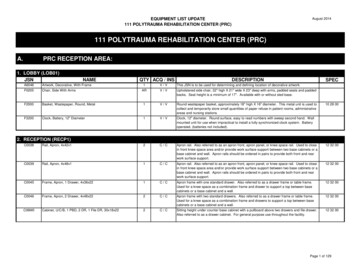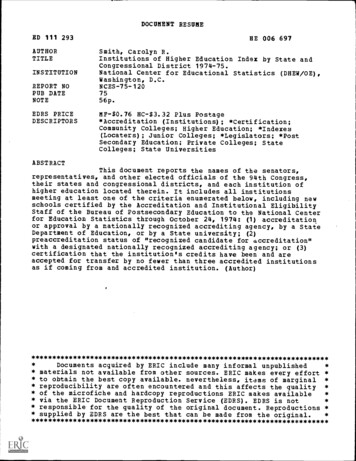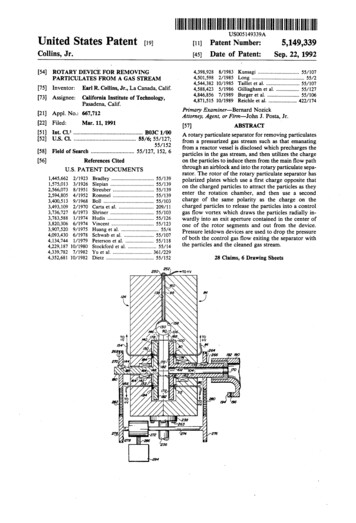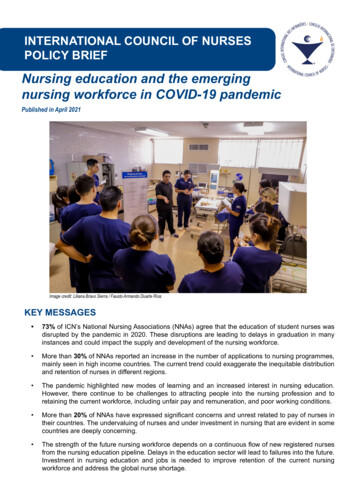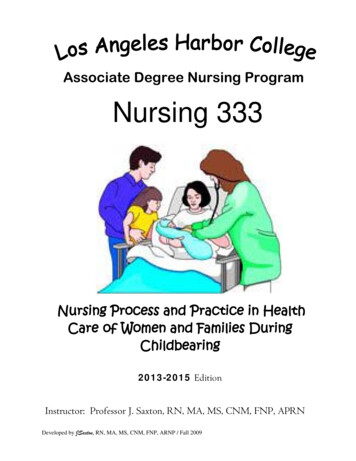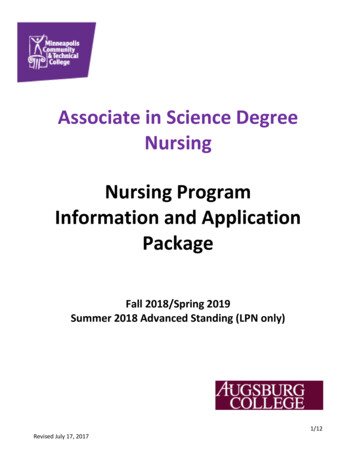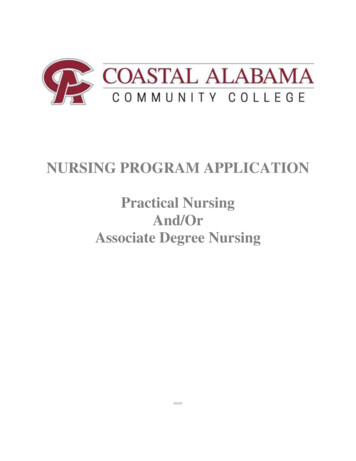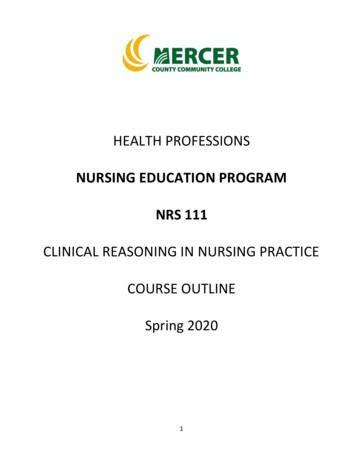
Transcription
HEALTH PROFESSIONSNURSING EDUCATION PROGRAMNRS 111CLINICAL REASONING IN NURSING PRACTICECOURSE OUTLINESpring 20201
COURSE OUTLINECourse Number: NRS 111Course Title: Clinical Reasoning in Nursing PracticeCredits: 1Weeks: 14Hours: 1 Theory Hour/WeekCatalog descriptionThis course introduces the learner to clinical reasoning used in nursing. In this course the student learns to usecritical thinking that underscores the thinking represented in the nursing process as well as dealing with aspectsof the healthcare system for safe practice in the current healthcare environment. This course forms the basis forthe thinking processes applied throughout all nursing courses.Prerequisites: Formal admission to nursing program or current Licensed Practical Nurse (LPN) licenseCorequisites: NRS 112 or current LPN licenseThis course will be presented using material online no text is requiredCourse CoordinatorProfessor Tracy Scaletti, MSN, RN, CENOffice: MS 155Phone: 609-570-3895Email: scalettt@mccc.eduThe most effective way to communicate with Professor Scaletti outside of class is via e-mail. Student e-mailswill be returned within 48-72 hours, excluding weekends and holidays. Due to varying work hours andlocations, checking of voicemail may not be as timely.Course ExpectationsThere are intellectual standards in this course, and each student is responsible for their own learning. Anystudent with questions about their progress should make an appointment with Professor Scaletti to discusstheir concerns. Any student with a personal issue affecting their ability to be successful in this course isresponsible for bringing it to Professor Scaletti’s attention in timely manner and in accordance with the policiesset forth for the nursing program. All communications during this course are expected to be conducted in aprofessional manner, and each student’s personal conduct is expected to be reflective of a professionalregistered nurse.2
Information ResourcesNursing Program website – www.mccc.edu/nursingMercer Online (Blackboard Platform) - http://mccc.blackboard.comNCSBN NCLEX-RN Detailed Test Plan – https://www.ncsbn.org/2019 RN TestPlan-English.pdfPlease refer to the Nursing Program Information Handbook for program philosophy, program objectives, andother pertinent information regarding NRS 111 and other nursing courses.Academic HonestyAcademic honesty is important to the learning organization's purpose of helping learners to develop critical,independent thinking skills and habits. Cheating and other forms of academic dishonesty run counter to thispurpose and violate ethical and intellectual principles; they are therefore subject to penalties. For purposes ofthis course, we will define academic dishonesty as:PlagiarismPresentation of work that originates from another unacknowledged source as one's own; presentingsomeone else's ideas, argument, or information verbatim (or close to verbatim) without acknowledgementof the source in assessments, papers, or discussions, constitutes plagiarism.Cheatinga) Giving, receiving, using, or attempting to give, obtain, or use unauthorized information or assistanceduring an assessment or an examinationb) Obtaining, conveying, or attempting to obtain or convey unauthorized information about anassessment or examination questionsc) Giving or receiving assistance on an essay or assignment that goes beyond that specifically allowedby the instructor (including buying and selling or attempting to buy or sell essays and/or researchassistance relating to course assignments),d) Impersonating someone else or allowing oneself to be impersonated in an examination orknowingly availing oneself of the results of impersonation, ande) Presenting a single piece of work in more than one course without the permission of the instructorsinvolved.Academic Integrity StatementMercer County Community College is College is committed to Academic Integrity – the honest, fair andcontinuing pursuit of knowledge, free from fraud or deception. Thus, students are expected to beresponsible for their own work, and faculty and academic support services staff members will take3
reasonable precautions to prevent the opportunity for academic dishonesty. The college recognizes thefollowing general categories of violations of Academic Integrity with representative examples of each.A. Using or obtaining unauthorized assistance in any academic work Copying from another student’s exam Using notes, books, electronic devices, or other aids of any kind during an exam when prohibited Stealing an exam or possessing a stolen copy of an examB. Giving fraudulent assistance to another student Completing a graded academic activity or taking an exam for someone else Giving answers to or sharing answers with another student before, during, or after an exam or othergraded academic activity Sharing answers during an exam by using a system of signalsC. Knowingly representing the work of others as one’s own or representing previously completedacademic work as current Submitting a paper or other academic work for credit which includes words, ideas, data or creativework of others without acknowledging the source. Using another author’s words without enclosing them in quotation marks or paraphrasing them orwithout citing the source appropriately Presenting another individual’s work as one’s own Submitting the same paper or academic assignment to another class without the permission of theinstructorD. Fabricating data in support of an academic assignment Falsifying bibliographic entries Submitting any academic assignment which contains falsified or fabricated data or resultsE. Inappropriately or unethically using technological means to gain academic advantage Inappropriate or unethical acquisition of material via the Internet or by any other means Using any electronic or hidden devices for communication during an examEach instructor and academic support service area is authorized to established specific guidelines consistentwith this policy.Consequences for Violations of Academic IntegrityFor a single violation, the faculty member will determine the course of action to be followed. This mayinclude assigning a lower grade on the assignment, assigning a lower final grade, failing the student in thecourse, or other penalty appropriate to the violation. In all cases, the instructor shall notify the Chair of theAcademic Integrity Committee of the violation and penalty imposed.ADA StatementMercer County Community College is committed to ensuring the full participation of all students in all activities,programs, and services. If you have a documented differing ability or think that you may have a differing abilitythat is protected under the ADA and Section 504 of the Rehabilitation Act, please contact Arlene Stinson in LB216 stinsona@mccc.edu for information regarding support services. If you do not have a documented differing4
ability, remember that other resources are available to all students on campus including academic supportthrough our Academic Learning Center located in LB 214.The Nursing Program Handbook Information PacketEach nursing student receives a copy of this handbook, is responsible for the information contained in thehandbook, and is expected to comply with all requirements and policies.First Semester StudentsA coach has been assigned to assist you with navigating your first semester in college. Coaches help withunderstanding how Mercer works, finding appropriate help with course work, and establishing academicgoals. Visit www.mccc.edu/coaching to find your coach or Contact: Arlene Stinson, LB217, 570-3451,SOAR@mccc.edu.Use your “MyMercer” Portal!Your “MyMercer” portal contains your Mercer Mail, financial information, class schedule, grades, and otherinformation. Check your “MyMercer” portal every day! Visit www.mccc.edu/mymercer to access yourportal.Tutoring supportAcademic support services are free and available for all students. Drop in at LB214 on the West WindsorCampus or call 609-570-3422.Reasonable Accommodations for Students with Documented DisabilitiesThe Office of Special Services (OSS) provides continued support to students with documented disabilities.Support staff are available to help students with differing abilities make a smooth transition to college aswell as to succeed throughout their college experience. Contact: Arlene Stinson, LB 217, 570-3525,stinsona@mccc.edu.Career and Transfer CenterPlanning to go to work or to transfer to a 4-year college after completing your Mercer degree? Contact theCareer and Transfer Center for support and advice. E-mail transfer@mccc.edu or call (609) 5864800 ext.3307.Counseling ServicesAre you experiencing personal challenges, feeling overwhelmed? Are you having stress and anxiety?Counseling services are available free of charge. Contact 609-586-4800, extension 3423 or extension 3410.Veteran’s ServicesIf you are military, veteran, or family member, we offer free support for you. Email vets@mccc.edu or call609-570-3240.STUDENT LEARNING OUTCOMESMercer County Community College Institutional Learning GoalsIL1Written and oral communication in English: Students will communicate effectively in both speechand writing.5
IL2Mathematics: Students will use appropriate mathematical and statistical concepts and operationsto interpret data and to solve problems.IL3Science: Students will use the scientific methods of inquiry for the acquisition of scientificknowledge.IL4Technology: Students will use computer systems or other appropriate forms of technology toachieve educational and personal goals.IL5Social Science: Students will use social science theories and concepts to analyze human behaviorand social and political institutions and to act as responsible citizens.IL6Humanities: Students will analyze works in the fields of art, music, or theater; literature; philosophyand/or religious studies; and/or will gain competence in the use of a foreign language.IL7History: Students will understand historical events and movements in World, Western, nonWestern, or American societies and assess their subsequent significant.IL8Diversity and Global Perspective: Students will understand the important of a global perspectiveand culturally diverse peoples.IL9Ethical Reasoning and Action: Students will understand ethical issues and situations.IL10Information Literacy: Students will recognize when information is needed and have the knowledgeand skills to locate, evaluate, and effectively use the information for college level work.IL11Critical Thinking and Problem Solving: Students will use critical thinking and problem solving skills todistinguish among inferences, opinions and facts.Program Student Learning OutcomesP1Provide safe, quality, evidence-based, patient-centered nursing care in a variety of healthcaresettings to diverse patient populations across the lifespan.P2Engage in clinical reasoning to make patient-centered care decisions.P3Participate in quality improvement processes to improve patient care.P4Collaborate with members of the interprofessional team, the patient, and the patient’s supportpersons.P5Use information management (informatics) principles, techniques, and systems, and patient caretechnology to communicate, manage knowledge, mitigate error, and support decision-making.P6Assimilate leadership, management, legal, and ethical guidelines in practice as a Registered Nurse.Course Student Learning Outcomes with Competencies:At the conclusion of this course, the student will be able to apply clinical reasoning skills while caring forpatients with a focus on wellness and the care of patients experiencing uncomplicated conditions. Thestudent will be able to:A. Engage in clinical reasoning to make patient-centered care decisions. Institutional Learning Goals 9, 11and Program Goals 1, 2, 5, 6.B. Explain the thinking skills and strategies that are used when applying clinical reasoning in nursing.6
C. Give examples of how thinking skills and strategies are applied to patient care situations.D. Give examples of how thinking skills and strategies are applied to problem solving in the healthcareenvironment.E. Discuss the importance of using clinical reasoning to anticipate risks, and predict and manage potentialcomplications.F. Explain the steps that make up the nursing process.G. Discuss how the nursing process is an example of how nurses apply clinical reasoning.Concept Based CurriculumThis nursing curriculum utilizes a conceptual approach to learning. See the Nursing Program Handbook fora complete list of concepts.AttendanceStudents are expected to attend all lecture sessions. If you cannot avoid an absence, contact your instructorprior to the activity to be missed. Prolonged absences due to illness, injury, or bereavement for an immediatefamily member should be reported to the Nursing Office. Please see the Attendance Policy found in the NursingProgram Handbook Information Packet for further information regarding the Nursing Program policy onattendance.Per the Nursing Education Attendance Policy, two points will be deducted from the overall course grade forevery unexcused absence from any educational session. Two episodes of unexcused lateness will betreated as an unexcused absence; points will be deducted from the final course grade accordingly. Eachrequest for an excused absence will be considered separately, on its own merit. Any combination of morethan two absences in theory, lab, or clinical may result in inability to meet course objectives and coursefailure. For the full policy, see the Attendance Policy on the nursing program website.Determination of NRS111 Grade:The grade is NRS111 will be determined by:AssessmentQuiz 1Quiz 2Quiz 3Time Management Log projectGroup PresentationHESI Critical Thinking ExamTotalPercentage of Grade20%20%20%15%10%15%100%7
A final grade of "C " (77% - 79.99%) or better in each nursing course is necessary to progress to the nextnursing course and to graduate. No grades will be rounded. If all criteria for the determination of a gradefor NRS 111 have been successfully met, a grade will be assigned as follows:AAB BBC CDF93% - 100%90% - 92.99%87% - 89.99%83% - 86.99%80% - 82.99%77% - 79.99%70% - 76.99%60% - 69.99%0% - 59.99%HESI Critical Thinking ExamThe HESI Critical Thinking Exam will be taken in class during the regularly scheduled class time. Please seethe course calendar for a specific date and time. You must bring either a laptop or tablet capable to accessthe internet either via hotspot, WiFi or cellular service. You will take this exam on your own device.Cellphones are not an approved electronic device to be used for this exam.8
Weekly Course OutlineWeek - Class DateWeekly Course Learning Objective1 –January 21, 2020Define and contrast critical thinking, clinicalreasoning and clinical judgement in nursingpractice. Critical thinking and timemanagement.PEER MENTORING WITH 3RD SEMESTERSTUDENTSExamine the development of criticalthinking in nursing practice with criticalthinking indicators. Demonstrate the useof critical thinking and concept mappingin nursing practice.Apply critical thinking attributes tocommunication in nursing practice.HESI EXAM (CM110 9p-10p)You must bring a compatible deviceApply critical thinking in the nursing process.2 – January 28, 20203 – February 4, 20204 – February 11, 20205 – February 18, 20206 – February 25, 20207 – March 3, 2020PEER MENTORING SESSION #28 – March 10, 20209 – March 24, 202010 – March 31, 202011 – April 7, 202012 – April 14, 2020Distinguish how critical thinking impactsquality improvement. Dissect criticalthinking failures in nursing practice andfailure to rescue scenarios.Spring Break (March 16-22, 2020)Construct conflict managementtechniques applicable to nursing practice.AssessmentClass discussionPeer DiscussionClass discussionQuiz 1Class DiscussionHESI ExamClass discussionPeer DiscussionTime log dueClass discussionAssign group projectsClass discussionQuiz 2PEER MENTORING SESSION #3Peer DiscussionClass Group PresentationsClass discussionClass Group PresentationsClass discussionQuiz 313 – April 21, 2020Apply critical thinking attributes to teachingin nursing practice. Relate current trends incritical thinking as it applies to nursingClass discussionpractice.Relate the impacts of Evidence Basedpractice on nursing care.14 – April 28, 2020Explain the importance of reflection relatedto critical thinking in nursing practice.Class discussionExamine the impact of teamwork oncritical thinking in nursing practice.Weekly course outline and assignment dates are subject to change at instructor’s discretion.9
Time Management Log ProjectEach student will complete a time management log and an essay reflecting on how they have managed thenew demands of entering the nursing program. The essay should be completed using APA format. Thecomponents of the assignment should include:1. An ideal log (one week) which demonstrates how the students believes that they should spendtheir time to be successful2. An actual log (one week) which shows how the student has spent their time3. An essay that includes:a. How the ideal and the actual log are different.b. What issues impacted their ability to meet the goals in their ideal log.c. Possible ways this could impact their performance in the nursing program and when caringfor clients.4. The assignment should be completed in Microsoft Word and submitted via blackboard. The timelog can be completed in tables that are included with the essay. NO ABSRACT IS NECESSARY.RubricIdeal LogPoor 1ptIdeal Log is not completeor may be missing entirely.Actual LogIdeal log is mostly wellformulated and completeand demonstrates arealistic depiction ofweekly activities.Poor 1ptActual Log is not completeor may be missing entirely.Reflection ContentGood 1.5ptGood 1.5ptActual log is mostly wellformulated and completeand demonstrates arealistic depiction ofweekly activities.Excellent 2ptIdeal log is complete, wellformulated and presentsa very thorough andrealistic depiction ofweekly activities.Excellent 2ptActual log is complete,well formulated andpresents a very thoroughand realistic depiction ofweekly activities.Poor 5ptGood 6.5ptExcellent 8ptThe essay fails to integrateclassroom materials abouttime management. Theprovided information doesnot sufficiently cover thedemands of the promptand fails to demonstrate anincreased understanding oftime management skills.The essay for the most partprovides adequateinformation summarizinglogs and comparing theme.Some classroom materialsare integrated. For themost part, this reflectionsufficiently demonstratessome increasedunderstanding of timemanagement.The essay is well writtenfrom start to finish,without spelling, grammaror use of English errors.The essay is wellorganized, clear andpresents ideas in acoherent way.10
Group ProjectEach group will present to the rest of class in Power Point format. All members of the team mustcontribute. The Power Point presentation can be no shorter than 7 minutes and no longer than 10minutes. This group project is a quality improvement project. Choose an area of nursing that as a group,you believe can be improved. Your topic must be approved prior to presenting and no two topics can bethe same. Use a defined quality improvement method, such as PDSA or Six Sigma, etc. A brief outline andreference page in APA format are required for the project as well.Power Point presentation criteria:1. Describe the Quality Improvement idea that you have chosen, factors such aslocation/environment, time of day (if provided), what is the problem given and any other detailsthat you consider important.2. Implement the quality improvement methodology the group has chosen and discuss how you wouldmeasure the problem and how you would measure the improvement.3. Give a brief description of what would be your team’s priorities are and why.4. Briefly explain your team’s plan to manage the challenges presented.Group Presentation RubricContent: Did
the thinking processes applied throughout all nursing courses. Prerequisites: Formal admission to nursing program or current Licensed Practical Nurse (LPN) license Corequisites: NRS 112 or current LPN license This course will be presented using material online no text is required
